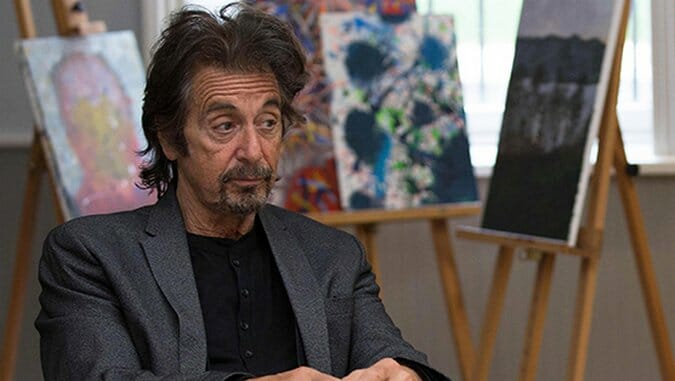
The translation of Phillip Roth’s words to the big screen has been a tricky feat for any filmmaker. You might recall the staid adaptation of The Human Stain (2003) or the bawdy spin on Goodbye Columbus (1969); many have argued that those leaps to a visual, more commercial, medium neutered the tone of Roth’s sexually torn, disenfranchised Jewish machismo. More affectingly and recent, the little-seen Elegy (2008), adapted from Roth’s The Dying Animal, dug closer to the core of the author, and now The Humbling, which covers similar ground, launches another ambitious, if not quite righteous, go at the heralded American provocateur.
In the role of Roth’s alter-ego, Al Pacino plays Simon Axler, a well-regarded stage actor who struggles to remain relevant as he sails across the septuagenarian mark. Much of what Pacino has done on the silver screen over the past decade has tended towards warmed-over mush, which is cause for lament considering this is the icon of cinema who so indelibly barked out “Attica!” in Dog Day Afternoon and anchored Francis Ford Coppola’s timeless Godfather trilogy. (For the record, I’ll cite Jack and Jill and 88 Minutes and leave it at that.) The two endeavors in which Pacino has shone during that drought weren’t theatrical releases but the cable-produced biopics of Jack Kevorkian (You Don’t Know Jack) and Phil Spector, which is a fitting: Barry Levinson (Rain Man and The Natural) directed Pacino in Jack, and again steers him here.
Given the timing of The Humbling, it would seem as if there were some type of conspiracy in the film development universe. The mid/late-life crisis that Simon endures is eerily similar to the one Michael Keaton’s former action-hero navigates in Birdman, a much droller and meatier affair than this. When first we meet Simon, he’s delivering a performance of Shakespeare’s As You Like It to a rapt audience, but because he’s distraught, disillusioned and disgusted with his station in life, he takes a sudden suicidal-esque swan dive into the adoring crowd. The act sends him to a sanitarium for some mental R&R, and later, back at his spare Connecticut manse, he reconnects with the daughter of a neighbor. Which is when things get weird.
That young woman, Pegeen (Greta Gerwig), a lit professor at a small rural college, has had a star crush on Simon since she was a child. In turn, she makes herself readily available to the recovering actor, even though she’s a lesbian and young enough to be his grandchild. The union is comfortable, if icky, at first, though it marks the beginning of some circuitous mayhem for the remainder of the film. Next Simon must dodge stalker Sybil (Nina Arianda), one of his sanitarium mates who’s also newly discharged and wants Simon to off her husband because he molested their child, and because Simon played an avenging killer once on screen—making her believe he has the moxie to do the deed and the acting chops to throw off the police.
Crazy is as crazy wants, and what might have been as taught a dynamic of sex, age and power as Elegy was wanes in the onslaught of hyperbole. If the murder plea isn’t enough, Simon’s harassed (via cell phone) by Pegeen’s lover (Kyra Sedgwick), the dean at her school, and then there’s Pegeen’s overinvolved parents (a wonderful pairing of Dianne Wiest and Dan Hedaya) plus Simon’s needling therapist (Dylan Baker), who conducts their sessions via Skype. All this, threaded throughout with Simon’s delusional daydreams of Pegeen and a “new” girlfriend, recently scooped at a local restaurant, frolicking in lingerie.
Given the gravity of the situation, each notch up in tension and prospect of unhappy circumstance oddly doesn’t seem to register on Simon. When Sybil calls, Simon remains impervious to the ramifications and macabre nature of what’s being asked of him, as if he’s on Prozac or some other mind-numbing cocktail. The farce that finds him so often also makes the relationship with Pegeen—the film’s potential anchor—feel rather unlikely and contrived. Gerwig, having carried Frances Ha convincingly, works tirelessly to shore up the seams of credibility here, but she acts as if she’s in another movie.
There is, needless to say, an overall disconnect between every facet of the story and every other, the fault of which could lie in writer Buck Henry’s (The Graduate and To Die For) and Levinson’s mercurial interweave of sardonic black comedy and whimsical hijinks (something not often found in Roth’s prose). Then there is Pacino’s apathetic rendering of Simon, which, while not entirely his fault, does largely drag the film down in the dumps with him.
Aptly however, all the mottled pieces fall into place when Pacino’s beset performer winds up back in his familiar milieu, up on the stage and confidently chewing his way through a modernized version of King Lear. In the denouement, he veers drastically from the Bard’s script, leaving the audience agape. In that one crystalline and well-tended ember, there’s a sudden poignancy. All the distracting madness that preceded it ebbs, and Pacino shines, his passion for all things Shakespeare (which he expressed so ebulliently in his directorial effort, Looking for Richard) pouring forth effusively. It’s the film’s most surprising and genuine moment, and a muffled “Whoo-ah!” of what might have been.
Director: Barry Levinson
Writer: Buck Henry
Starring: Al Pacino, Greta Gerwig, Kyra Sedgewick, Dylan Baker, Diane Wiest, Dan Hedaya, Nina Arianda
Release Date: Jan. 23, 2015
Tom Meek is a writer living in Cambridge, MA. His reviews, essays, short stories and articles have appeared in The Boston Phoenix, Paste Magazine, The Rumpus, WBUR’s ARTery, Charleston City Paper and SLAB literary journal. Tom is also a member of the Boston Society of Film Critics and rides his bike everywhere. You can follow him on Twitter.